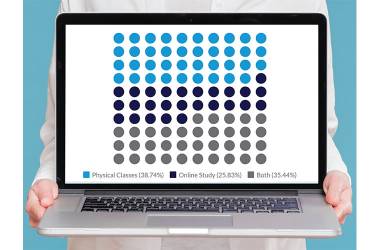Students from 21 Countries Participate in Wittenborg's Survey on Remote Learning
Students from 21 Countries Participate in Wittenborg's Survey on Remote Learning
Students from 21 Countries Participate in Wittenborg's Survey on Remote Learning
Majority of Wittenborg Students Positive about Achieving Study Goals Despite COVID-19
Most students at Wittenborg University of Applied Sciences are confident that they will achieve their study goals and gain sufficient credits to proceed to the next academic year, despite the inconveniences caused by COVID-19, a survey has revealed as classes are wrapped up ahead of the summer break. Wittenborg also received high praise from students for its swift response to the pandemic and the measures put in place in March to ensure that the study programme for the remainder of the academic year was not disrupted.
"I Feel Grateful My Studies Were not Delayed"
Just over 63% of participants believe they will achieve their study goals or credits, while 23% are not sure and 13% answered negatively, though not all reasons for this are connected to the situation caused by COVID-19. A male student from Russia quipped: "No, I won't achieve my study goals for many reasons, and Covid-19 isn't the only thing to blame." Participants of the survey are from 21 different countries around the world.
Many credited the support they received from Wittenborg for staying the course. "I believe that it is admirable how the university was able to adapt in such a situation and provide a good-quality education," one female student said.
"Also, Wittenborg was able to make important decisions about when in-class studying would begin again, changing Type 1 exams to Type 2 exams in a considerably short time, providing a strong feeling of certainty. As a student, I feel really grateful that my studies were not delayed due to the pandemic. I admire the effort of the board of directors, lecturers and all staff members and I have learned to appreciate WUAS more than I did before."
Lack of Social Contact
About 60% of students also admitted to suffering from a lack of social contact during the different levels of lockdown imposed by countries – whether they were in the Netherlands or in their home countries. "I managed to stay in contact with family and friends via Skype and social media, but being far from home in the delicate situation we are living in is not easy," one European student said. Others were nervous about studying online and some said they were affected psychologically. "I was very anxious about assignments and making deadlines. This kept me in front of the computer always." Those who left the Netherlands found comfort being with family, but had to adapt to time differences and busy households.
Online or In-Class?
When asked whether they now preferred online study to class study, the majority leaned towards physical classes (38,7%) or a combination of both (35,4%). About a quarter (25,8%) preferred purely online studying. In laying out Wittenborg's plans for the new academic year, the chair of the executive board, Peter Birdsall, said in a statement that though there are no plans to transform Wittenborg into an online institution, its IT capacities were immensely bolstered during the remote-learning period from March to the end of June. From 1 July, all institutions of higher education in the Netherlands were allowed to resume classes in person.
Students said some of the positive things about studying online were that it eliminated travel time and having all the study material online means they can study at their own pace, from the comfort of their home and experience more flexibility. "I can access the slides or videos at any time, and it is very helpful because I’m unavailable during the day so I get the chance to finish and review work at night," one student said.
Challenges?
When asked what challenges they faced, about 93% of students said they experienced no to very few technical glitches in adjusting to the new online learning environment. Some pointed to the fact that some subjects – like finance – were hard to grasp online. Other challenges included the occasional misunderstanding, lack of interaction with fellow students and teachers, added workload and problems with working in teams.
Adequately Informed
Overall, 75% of students felt they were well supported by lecturers and other staff during the remote-learning period, while just over 96% believed they were adequately and continuously informed by Wittenborg about how COVID-19 would affect the study programme. One student wrote: "Continuous updates were sent to students with very detailed and clear information about the current situation and how it would affect our studies."
Another said: "I think the emails sent out were effective and informative. Also through the title I was able to evaluate quickly if this was just general news or if it was relevant for the continuance of my study."
Students who participated in the survey are from Russia, India, the US, Nigeria, Syria, the Democratic Republic of Congo, Australia, the Netherlands, China, Austria, Italy, Vietnam, Pakistan, Germany, Indonesia, Iran, Turkey, Zimbabwe, Bangladesh, Egypt and Guatemala.
WUP 15/7/2020
by Anesca Smith
©WUAS Press
838 words
